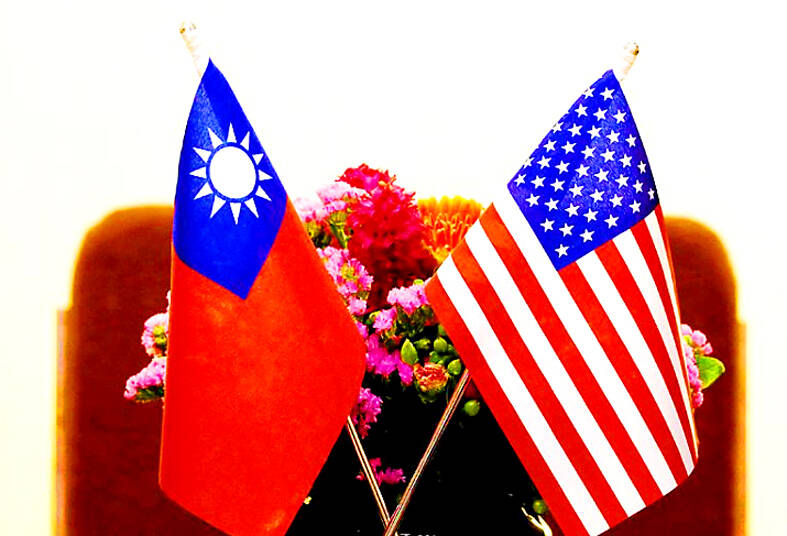US lawmakers on Friday proposed a bicameral and bipartisan bill to approve the first agreement under the US-Taiwan Initiative on 21st-Century Trade.
The proposal was made after representatives from Taiwan and the US signed an initial agreement under the trade initiative in the US on Thursday.
US Senator Ron Wyden, chairman of the Senate’s Finance Committee, and US Representatives Jason Smith, chairman of the House Ways and Means Committee, among others signed the proposed legislation on Friday.

Photo: Tyrone Siu, Reuters
The passage of the US-Taiwan Initiative on 21st-Century Trade First Agreement Implementation Act is necessary to put the initiative into action and ensure that Taiwan-US relations would have a “durable [and] reliable legal framework,” the Senate Finance Committee said in a news release.
“The United States and Taiwan share democratic values, deep economic ties and strong people-to-people connections,” Wyden, a Democrat from Oregon, was quoted as saying.
“My colleagues and I want to ensure these agreements have the support and durability of a bipartisan approval process behind them,” he said.
The legislation requires US President Joe Biden to issue a report to the US Congress indicating he has determined that Taiwan would take the necessary measures to comply with the terms of the agreement and that the agreement would advance the interests of US workers, farmers and consumers, the news release said.
The bill requires US officials to ensure that any additional agreements with Taiwan would be made transparently and in full consultation with the Congress, it said.
The legislation is to be reviewed by all relevant and appropriate committees in the House before heading to the Senate.
The legislation must be passed by both chambers and signed by Biden to take effect.
The agreement is a symbolic show of support from Congress, as the trade initiative deal is not governed by the rules that typically apply to treaties with foreign states, the Central News Agency reported, citing unnamed sources.

UNILATERAL MOVES: Officials have raised concerns that Beijing could try to exert economic control over Kinmen in a key development plan next year The Civil Aviation Administration (CAA) yesterday said that China has so far failed to provide any information about a new airport expected to open next year that is less than 10km from a Taiwanese airport, raising flight safety concerns. Xiamen Xiangan International Airport is only about 3km at its closest point from the islands in Kinmen County — the scene of on-off fighting during the Cold War — and construction work can be seen and heard clearly from the Taiwan side. In a written statement sent to Reuters, the CAA said that airports close to each other need detailed advanced

Tropical Storm Fung-Wong would likely strengthen into a typhoon later today as it continues moving westward across the Pacific before heading in Taiwan’s direction next week, the Central Weather Administration (CWA) said. As of 8am, Fung-Wong was about 2,190km east-southeast of Cape Oluanpi (鵝鑾鼻), Taiwan’s southernmost point, moving westward at 25kph and possibly accelerating to 31kph, CWA data showed. The tropical storm is currently over waters east of the Philippines and still far from Taiwan, CWA forecaster Tseng Chao-cheng (曾昭誠) said, adding that it could likely strengthen into a typhoon later in the day. It is forecast to reach the South China Sea

Almost a quarter of volunteer soldiers who signed up from 2021 to last year have sought early discharge, the Legislative Yuan’s Budget Center said in a report. The report said that 12,884 of 52,674 people who volunteered in the period had sought an early exit from the military, returning NT$895.96 million (US$28.86 million) to the government. In 2021, there was a 105.34 percent rise in the volunteer recruitment rate, but the number has steadily declined since then, missing recruitment targets, the Chinese-language United Daily News said, citing the report. In 2021, only 521 volunteers dropped out of the military, the report said, citing

WEATHER Typhoon forming: CWA A tropical depression is expected to form into a typhoon as early as today, the Central Weather Administration (CWA) said yesterday, adding that the storm’s path remains uncertain. Before the weekend, it would move toward the Philippines, the agency said. Some time around Monday next week, it might reach a turning point, either veering north toward waters east of Taiwan or continuing westward across the Philippines, the CWA said. Meanwhile, the eye of Typhoon Kalmaegi was 1,310km south-southeast of Oluanpi (鵝鑾鼻), Taiwan’s southernmost point, as of 2am yesterday, it said. The storm is forecast to move through central